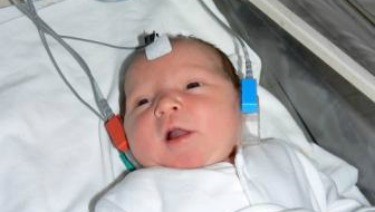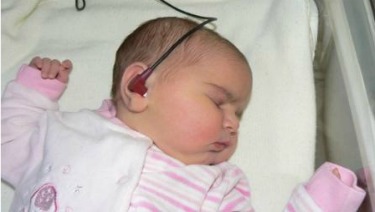By: Julia L.Hecht, MD FAAP
Learning to communicate through language is a critical part of your child's development. Because hearing typically plays a big role, it's important to have your child's hearing tested at key milestones, starting at birth.
Most newborns hear well, but every year an estimated 6,000 are born in the U.S. with hearing that falls outside the typical range. Early screening is a crucial step in identifying children who need early intervention and support to gain language skills that will help them learn.
The American Academy of Pediatrics (AAP) supports the newborn hearing screenings required in all 50 states. And because a child's hearing can change over time, we also
recommend yearly hearing screenings for children aged 4 through 6, followed by additional screening at ages 8 and 10. Adolescents and teens should receive at least 3 hearing screenings to detect any changes that might affect language, academics and social well-being.
Here's what parents and caregivers should know about hearing screenings, hearing tests and steps needed to support language development.
What is the timing of newborn hearing screening?
Your baby's first hearing screening will happen within 1 to 2 days of birth. If you deliver in a hospital, the screening will probably happen before you go home. If you give birth at home or in a birthing center, or leave the hospital within 24 hours, your baby's doctor will help coordinate the hearing screen.
How will hearing screening benefit my child?
Having clear, accurate information about your child's hearing is essential, since some hearing levels without intervention can lead to:
Difficulty understanding others
Delayed speech and language skills
Learning difficulties in school
Negative feelings about themselves
Trouble making friends and relating to others
Challenges with family relationships
I can tell my baby hears me. Are tests really necessary?
You might wonder about the need for formal screening, since your infant may startle, blink or turn their head in response to different sounds. Many newborns react this way but still have trouble hearing well enough to learn spoken language. Because your child learns to speak by listening and processing what they hear, hearing concerns that go undetected can affect the early learning and language development that lays a foundation for success in school and life.
How do newborn & childhood hearing tests work?
Newborn hearing screening is pain-free and takes around 5 to 10 minutes to complete. The screening may be done while your baby is sleeping or lying still.
These two methods are commonly used to screen newborns:

Automated auditory brainstem response (AABR) screening measures how well a child's hearing nerve and brain respond to sound. Soft earphones are used to transmit clicks or tones into the baby's ears while sensors placed on the baby's head measure responses. This screening test is used for newborns and infants up to 6 months, and must be done while the infant is asleep
 Otoacoustic emissions (OAE) screening measures sound waves produced in a child's inner ear. A tiny probe is placed just inside the ear canal, where it measures the ear's response (echo) when clicks or tones are played in the child's ears. This test can be used for newborns, but also works for older children. Children may be awake, but must be quiet and still.
Otoacoustic emissions (OAE) screening measures sound waves produced in a child's inner ear. A tiny probe is placed just inside the ear canal, where it measures the ear's response (echo) when clicks or tones are played in the child's ears. This test can be used for newborns, but also works for older children. Children may be awake, but must be quiet and still.
Pure tone audiometry for preschoolers & older kids
Starting at 4 years old, children may undergo
pure tone audiometry (PTA) screening. For this screen, kids are asked to raise their left or right hand when they hear sounds on that side of the body. Using earphones in a quiet space, the screener tests each ear at different frequencies, since hearing changes may affect just one ear.
If there are concerns about a child's hearing following a PTA screening, additional tests will help confirm any changes. Kids who have difficulty sitting still or raising their hands may be screened using other methods.
What if my newborn's hearing screen raises concerns?
If your baby's screening test falls outside the typical range, a repeat screen may be recommended. If the repeat screen shows concerns, follow-up testing with a hearing professional should be done as soon as possible—but no later than 3 months of age.
If my baby is deaf or hard of hearing, what happens next?
The first step is to reassure yourself that hearing differences do not make your child less healthy or whole than others. With timely intervention and support at home and school, your child can follow a healthy path of learning and development.
Studies show that babies who are deaf or hard of hearing have the best chance for language development when interventions begin by 6 months of age. The more language your child absorbs at home, daycare or out in the community, the more easily they will develop their own language skills.
Your child will benefit from a team approach that brings your pediatrician together with an audiologist and a pediatric
otolaryngologist (a specialist focused on the inner workings of the ear). Working together, these providers will measure your child's hearing abilities and recommend interventions, therapies and resources.
Because some D/HH kids can have problems with vision, your pediatrician will also recommend a visit to a pediatric
ophthalmologist (eye doctor). Some children also see a
geneticist to find out if there is an inherited cause of hearing changes.
If my newborn's hearing is fine, will they need to be screened later?
All children need routine hearing tests, since hearing can change significantly
as kids grow.
Common causes of childhood hearing changes include:
Newborns who spend long periods in a neonatal intensive care unit (NICU) may also face higher risks for hearing changes later in life.
The AAP recommends that all kids have hearing tests at ages 4, 5, 6, 8 and 10 years, with additional screenings between ages 11-14, 15-17 and 18-21. These screenings can diagnose hearing changes at the earliest possible stage, when interventions can have the greatest positive impact.
Your pediatrician may recommend a different screening schedule if hearing changes run in your family or there are environmental causes that could affect your child's hearing.
Keep in mind that hearing changes can be very gradual, making them hard to notice at first. Consistent screening helps assure that issues are not overlooked so your child receives the care and support that will help them thrive.
Hearing at home: signs to watch for in your child
Parents, caregivers and other family members are often the first to spot changes in a child's hearing. Even if your newborn's hearing screen shows no concerns, talk with your pediatrician if you notice that your child:
Doesn't startle at loud noises
Doesn't turn toward sounds
Is slow to begin talking or is hard to understand
Can't say single words such as "dada" or "mama" by 12 to 15 months
Is slow to sit or walk without support
Has trouble holding their head steady
Doesn't notice you until they see you
Focuses on vibrating noises more than other sounds
Shows no enjoyment or pleasure when you read to them
Doesn't always respond when called, especially from another room
Appears to hear some sounds, but misses others
Wants music or TV volume on louder than other family members
Why words matter when we're talking about a child's hearing
Like everyone, people who are deaf or hard of hearing are diverse and have the right to define their own identities. The terms "hearing-impaired" and "hearing loss" often are not preferred by the D/HH community. Because some people who are D/HH also experience other health conditions, the term DHH+, or DHH Plus, may be used to reflect their experiences. As your child grows into a young adult and develops their own identity, you can ask them how they would like to identify themselves. Learn more about affirming language and practices from the
National Association of the Deaf.More information
About Dr. Hecht
Julia L. Hecht, MD, FAAP, is a co-author of the
clinical report, "Hearing Assessment in Infants, Children, andAdolescents: Recommendations Beyond Neonatal Screening." She is a member
of the AAP Council on Children With Disabilities and the Section on
Developmental & Behavioral Pediatrics.